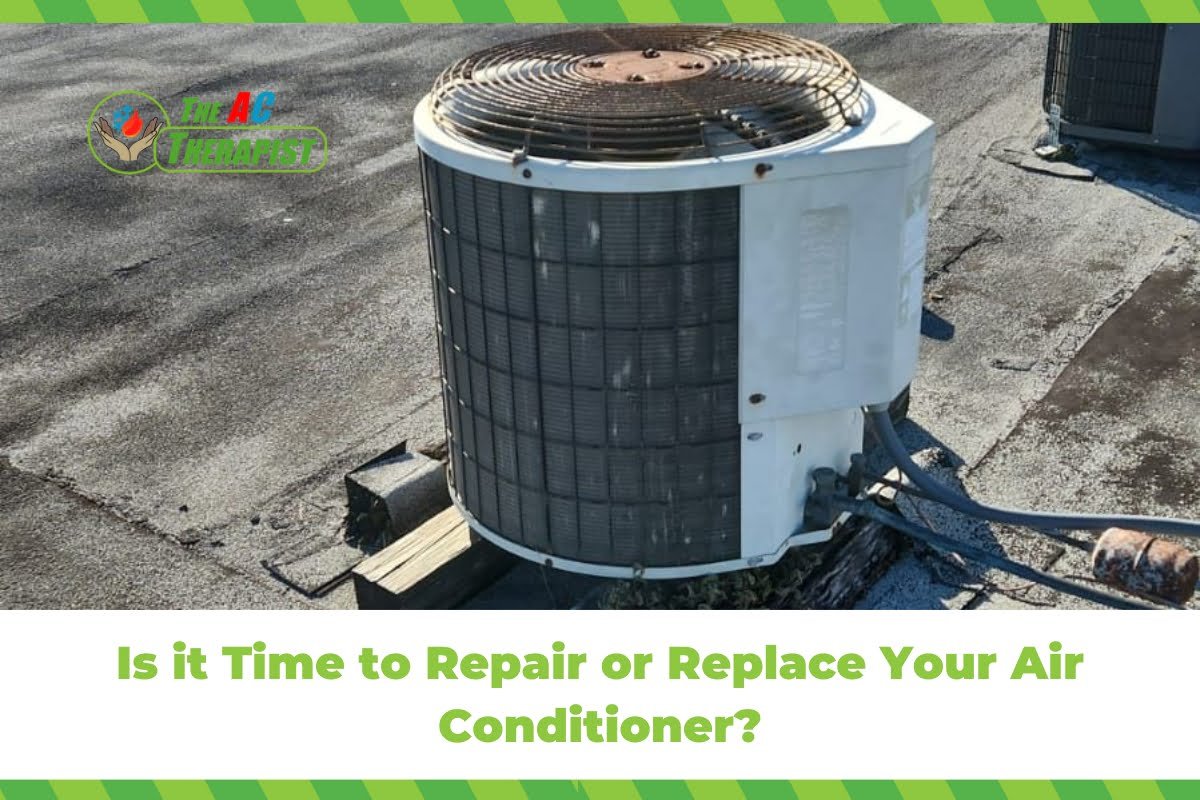Is it Time to Repair or Replace Your Air Conditioner?
Hey there! I’m from The AC Therapist, and if you’re reading this, you’re probably wrestling with a big question that many homeowners face: Is it time to repair or replace your air conditioner? Trust me, it’s a question I hear all the time in the Tampa Bay area, and it’s my pleasure to help you through this decision-making process. We’ll dive into various factors, like cost-efficiency, performance indicators, and the advanced features you could be enjoying with a new unit. So, let’s get started, shall we?
How Old is Your AC?
First off, let’s talk about the age of your air conditioner. These units usually last 10 to 15 years. If yours is in or past this range, it might be time to say goodbye and invest in a new one. Why? Well, the older it gets, the more it costs to maintain and repair.
Variables That Affect Lifespan
A variety of factors can affect how long your AC lasts. These include:
- Quality of the Unit: Not all air conditioners are created equal. Higher-end models typically last longer and come with warranties that could last up to 10 years.
- Frequency of Use: If you’re in a climate where the AC runs nearly year-round, expect a shorter lifespan compared to a unit in a colder climate.
- Maintenance: I can’t stress this enough—regular maintenance can extend the life of your unit significantly. That’s why we offer Therapy Maintenance Plans, to keep your AC running smoothly for as long as possible.
Signs It’s Nearing the End
If your unit is nearing that 10-15-year range, you should be on the lookout for signs of aging:
- Decreased Efficiency: Are your energy bills going up without a corresponding increase in use? A less efficient unit is a sign that the end may be near.
- Frequent Repairs: If you find yourself seeing me or any other HVAC technician more often, that’s a clear indication that your unit’s best days are behind it.
- Odd Noises and Smells: As your unit ages, you may notice unusual noises or musty smells coming from the AC. This could indicate failing parts or even potential health risks like mold.
Repair or Replace? Consider the Age Factor
Age is a vital factor in the repair or replacement dilemma. If your unit is:
- Less than 10 years old: Most issues can likely be repaired fairly cost-effectively.
- Between 10-15 years: You’ll need to weigh the costs and benefits carefully. If repairs are minor and infrequent, you might squeeze a few more years out of it. But if you’re facing costly repairs, replacement might be the smarter financial move.
- Over 15 years: It’s typically more cost-effective to replace the unit with a more efficient model that will save you money in the long run.
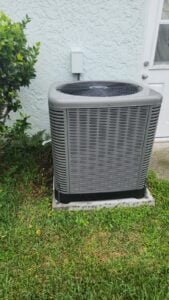
The Costs: Repair vs Replace
Repair Costs
Repairs can range anywhere from a minor $100 fix for something like a thermostat replacement to a major $1,000+ repair for a compressor. If your unit is relatively young and the repair is minor, this could be a cost-effective route. Plus, if you’re subscribed to one of our Therapy Maintenance Plans, you might also be eligible for discounts on these repairs.
Replacement Costs
A new AC unit will generally set you back between $2,500 to $7,500, depending on the brand, efficiency, and installation costs. It’s a considerable investment but remember, a new unit is likely to be more energy-efficient, which translates to lower energy bills. Over time, this could offset the initial costs of the unit.
Recurring Expenses
If you’re continually repairing your AC, those costs add up. Let’s say you’ve spent $600 on repairs this year on an older unit. Next year, you have another $400 in repairs, and your energy bills are also higher because of reduced efficiency. Suddenly, that new $4,000 energy-efficient unit doesn’t seem as expensive when compared to the mounting repair bills and energy costs.
Warranty Considerations
Always check your warranty. While your parts may be covered, labor often is not. And labor can be costly. With a new unit, you’re getting a new warranty, which can offer peace of mind and potential cost savings down the line.
Financing
For some, the upfront cost of a new unit is the biggest obstacle. However, there are financing options available. It allows you to make manageable monthly payments, which is especially helpful when you’re facing an emergency replacement situation.
Bottom Line
Costs are variable depending on your specific situation, but generally speaking:
- Repair if the unit is younger and the costs are manageable.
- Replace if the unit is older, the repair costs are high, and you’re facing increased energy bills.
Remember, if you’re having a hard time deciding, I’m always here to provide expert advice tailored to your situation. Give me a call, and we can work it out together.
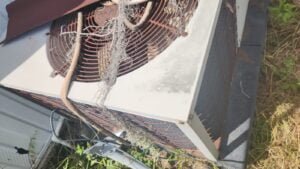
Performance Red Flags
1. Skyrocketing Energy Bills
If your energy bills are climbing faster than a Florida thermometer in July, it’s a clear sign that your AC is losing its efficiency. Older units have to work harder to produce the same cooling effect, burning more electricity in the process.
2. Uneven Cooling
When your AC was new, it probably cooled your rooms evenly. If you’re starting to notice that some rooms feel like a freezer while others are more like a sauna, your AC’s performance is waning.
3. Constant Repairs
If you’re on a first-name basis with your HVAC technician (even if it’s me!), it may be time to replace. Frequent repairs are costly and a sign that your system is failing.
4. Short Cycling or Running Continuously
An AC that turns on and off rapidly or one that runs continuously without adequately cooling your home is inefficient. Both scenarios are indicators that something is seriously wrong.
5. Unusual Noises or Odors
Your AC should operate fairly quietly. If it’s making more noise than your neighbor’s lawn mower or emitting unpleasant smells, you’ve got a problem that may be beyond repair.
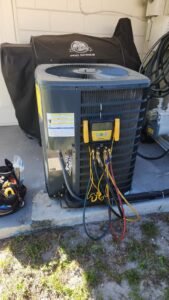
Repair vs. Replace Benefits
Repair Benefits:
- Lower Immediate Cost: Generally, repairing your unit will be less expensive upfront compared to replacing it entirely.
- Quick Fix: Repairs can often be done more quickly than a full replacement, which could be critical in the heat of summer.
- Extend Lifespan: Proper repairs can extend the life of your AC unit, delaying the need for a new system.
- Warranty: If your unit or its specific components are still under warranty, you could save significantly on repair costs.
Replace Benefits:
- Energy Efficiency: Newer units have better SEER ratings, meaning they are more energy-efficient. This will reduce your monthly energy bills.
- Long-term Savings: While the initial cost is higher, a new unit is an investment that could save you money in the long run by reducing the need for repairs and lowering energy bills.
- Increased Home Value: A new AC system can increase the resale value of your home.
- Latest Technology: New units often come with advanced features like smart thermostats, zoning capabilities, and more efficient cooling technologies.
- Peace of Mind: A new unit will come with a new warranty, and being new, is less likely to break down during those crucial hot months.
- Eco-friendly: Newer units are more likely to use eco-friendly refrigerants, making them better for the environment.
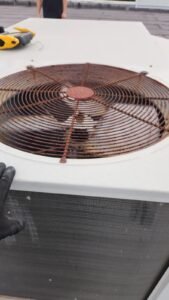
Think about the frequency of repairs
Often, it’s a matter of balancing short-term vs. long-term benefits. Repairing is generally a short-term solution that’s less costly upfront but may not save you money or headaches in the long run. Replacing your AC unit is a long-term solution that could provide greater efficiency, reliability, and peace of mind but comes with a higher initial price tag.
So, when you’re faced with this decision, take a good look at both the immediate and future benefits. And remember, as your AC Therapist, I’m always here to help you weigh your options and make the best choice for your situation. Feel free to reach out anytime.
The frequency of repairs is a critical factor when considering whether to replace your air conditioning unit. An AC system that needs frequent repairs is not only a drain on your wallet but also a significant inconvenience. Constant repairs interrupt your life, create discomfort, and can be particularly troubling during hot weather when you rely on your AC the most.
If you find yourself calling for service multiple times in a single cooling season or if you notice that the repairs are becoming more expensive, it’s a strong signal that your system is becoming less reliable and may be nearing the end of its useful life. In some instances, the cost of repairs could even amount to or exceed the cost of a new, more efficient system.
As your AC Therapist, I always recommend keeping a record of all repairs, including the type of repair and the cost. This will help you assess whether your system is falling into a pattern of frequent breakdowns. If the same part or a closely related one keeps failing, it’s likely that a replacement would be more economical and less stressful in the long run.
Another key point to consider is the “5,000 Rule,” which involves multiplying the age of your AC unit by the cost of the repair. If the resulting number exceeds 5,000, replacement is often the smarter financial decision.
Ultimately, an AC unit that requires frequent repairs is not just a question of immediate cost but also impacts your quality of life. A new system will bring greater reliability, enhanced comfort, and the peace of mind that comes from knowing you won’t have to deal with constant disruptions due to breakdowns.
If you’re facing frequent repairs, it might be time to weigh the benefits of investing in a new system. Feel free to contact me for an expert consultation tailored to your specific needs and situation. Together, we can explore the best course of action for your comfort and well-being.
What problems can be repaired in an air conditioner?
1. Refrigerant Leaks
If your AC is not cooling as efficiently as it used to, a refrigerant leak could be the culprit. The refrigerant is what cools the air within your AC system. Leaks can be identified and sealed, and then the refrigerant can be recharged to the appropriate level. However, it’s crucial to address leaks promptly, as low refrigerant levels can cause the compressor to overheat and fail, which is a much costlier issue to resolve.
2. Clogged Filters
Filters are your first line of defense against dust and pollutants. When they become clogged, airflow is restricted, forcing your AC to work harder. Not only does this make your unit less efficient, but it also increases wear and tear. The fix is simple: replace the dirty filter with a new one. Some filters are washable and can be cleaned instead of replaced.
3. Thermostat Issues
Thermostats control the temperature settings in your home, and if they malfunction, you could be facing issues with comfort and energy efficiency. Whether it’s a traditional dial-type thermostat or a programmable smart thermostat, issues are generally fixable. Sometimes, it could be as simple as replacing the batteries; other times, you might need to recalibrate the device or replace a faulty sensor.
4. Electrical Problems
These can range from faulty wiring to broken relays, and more. Electrical components like capacitors and circuit boards are often replaceable parts, although working with electrical components should always be left to professionals to ensure safety and effectiveness.
5. Drainage Issues
In humid environments, particularly here in the Tampa Bay area, the condensate drain line can become clogged with algae and other debris. This can lead to water leakage and potential water damage. Cleaning the line usually resolves the issue. In more severe cases, the drain pan may be rusted through and will need to be replaced.
6. Fan Problems
The fans in your AC unit play a critical role in its operation. The blower fan helps circulate indoor air, and the condenser fan releases heat outside. Problems can range from loose belts to worn-out motors and blades. These parts can typically be replaced without requiring a new unit.
7. Sensor Problems
Your AC unit relies on various sensors to monitor temperature and humidity levels. If these sensors go awry, your AC might cycle erratically or fail to cool your home effectively. Replacement is usually straightforward but should be done by a professional to ensure accuracy.
8. Coil Issues
Both the evaporator and condenser coils are essential for heat transfer. If they get dirty or frozen, they can’t function properly. Cleaning and defrosting are typically sufficient solutions, but severely damaged coils may require replacement.
9. Compressor Overheating
The compressor is like the heart of your AC unit. If it overheats, the entire system can fail. Overheating can be due to dirty coils, low refrigerant levels, or electrical issues. Identifying and fixing the root cause can often resolve the issue.
10. Noisy Unit
Various noises like banging, screeching, or rattling often signal specific issues such as loose or worn-out parts. Identifying and replacing the offending component is usually enough to resolve the noise.
However, if your unit is consistently breaking down and the repairs are becoming frequent and expensive, it may be more cost-effective to replace the unit. Plus, if the unit is old and inefficient, a replacement could offer a more energy-efficient and environmentally friendly solution.
As always, I recommend reaching out to a professional to properly diagnose and handle AC issues. Feel free to give me a call to discuss your specific situation!
Navigating the Cooling Crossroads: When to Repair and When to Replace Your AC, According to the AC Therapist
Choosing between repairing and replacing your air conditioning unit is never a decision to take lightly. After all, the comfort of your home or business, as well as the well-being of all who reside or work there, hang in the balance. As your AC Therapist, serving the Tampa Bay area, I can assure you that there are nuanced approaches to making this important choice, tailored to your unique set of circumstances.
For units that are still relatively young—let’s say less than seven years old—and have experienced a minor hiccup, a repair is often the most sensible path. It’s common for younger units to face issues like clogged filters, faulty thermostats, or minor electrical complications. These are not just repairable but are often expected aspects of general maintenance. A timely repair can extend the lifespan of your unit, offering you a cost-effective solution in the short term, and sparing you the higher upfront costs of a brand-new system.
That being said, it’s not just about the age of the unit. Consider its overall condition, performance, and the frequency of breakdowns. If your system is constantly failing and causing you to make repeated service calls, the financial strain and inconvenience could outweigh the benefits of holding onto it. Repairs can accumulate and eventually approach the cost of a new unit, without the added advantages a new system provides.
Now, let’s talk about older units or systems plagued by significant, recurring problems. In cases like this, the scale often tips in favor of replacement. Modern AC units come with a plethora of benefits: higher energy efficiency, eco-friendly refrigerants, advanced features like smart thermostats and zoning capabilities, and often, more robust warranties. While the upfront cost can be substantial, the long-term savings on energy bills and avoided repair costs can be significant. Plus, there’s the intangible but invaluable benefit of reliability—knowing that your AC will work when you need it the most, without fail.
Ultimately, the decision between repair and replacement isn’t just a financial one—it’s about quality of life. Do you want to continually stress about when your aging unit will fail next, or would you prefer the peace of mind that comes with a new, reliable, and efficient system?
In the end, as your dedicated AC Therapist, I’m committed to helping you make the best choice for your comfort and budget. Feel free to reach out for a consultation tailored to your specific needs. We can assess the health of your existing unit, explore potential repair and replacement options, and even discuss our Therapy Maintenance Plans for ongoing care. The bottom line is your comfort and satisfaction, and as always, I’m here to make your indoor living experience as enjoyable as possible.

